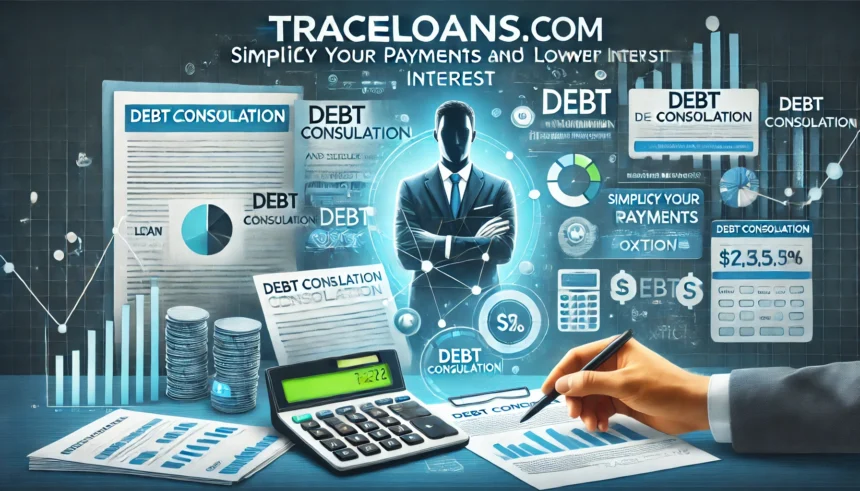Introduction To Traceloans.com Debt Consolidation
In today’s fast-paced world, managing multiple debts can feel overwhelming. From credit card bills to personal loans, keeping track of due dates, interest rates, and minimum payments can be a daunting task. If you’re struggling to stay on top of your finances, traceloans.com debt consolidation might be the solution you’ve been looking for. At Traceloans.com, we’re here to help you simplify your payments and lower your interest rates, making your financial journey smoother and more manageable.
What is traceloans.com debt consolidation?
traceloans.com debt consolidation is a financial strategy that involves combining multiple debts into a single loan or payment plan. Instead of juggling several payments with varying interest rates and due dates, you consolidate them into one monthly payment. This approach not only simplifies your financial life but can also help you save money by securing a lower interest rate.
How Does traceloans.com debt consolidation Work?
When you opt for traceloans.com debt consolidation, you take out a new loan to pay off your existing debts. This new loan typically comes with a lower interest rate, which can reduce the overall cost of your debt. Once your existing debts are paid off, you’ll only need to make one monthly payment toward the new loan. This streamlined approach can make it easier to manage your finances and stay on track with your payments.
Benefits of Debt Consolidation
1. Simplified Payments
The simplicity debt consolidation offers for your financial life is among its most important benefits.Instead of keeping track of multiple due dates and payment amounts, you’ll only have one payment to worry about each month. This helps to lower the possibility of late fines and payment missing.
2. Lower Interest Rates
By consolidating your debts, you may be able to secure a lower interest rate than what you’re currently paying on your existing debts. This can result in significant savings over time, allowing you to pay off your debt faster and more efficiently.
3. Improved Credit Score
Consistently making on-time payments toward your consolidated loan can have a positive impact on your credit score. Additionally, reducing your overall debt load can improve your credit utilization ratio, which is a key factor in determining your credit score.
4. Reduced Stress
Managing multiple debts can be stressful and time-consuming. Debt consolidation can alleviate this stress by simplifying your financial obligations and providing a clear path toward becoming debt-free.
5. Flexible Repayment Terms
Debt consolidation loans often come with flexible repayment terms, allowing you to choose a payment plan that fits your budget. Whether you prefer a shorter repayment period to pay off your debt quickly or a longer term to reduce your monthly payments, debt consolidation can be tailored to meet your needs.
Types of Debt Consolidation Loans

1. Personal Loans
A personal loan is one of the most common types of debt consolidation loans. These loans are typically unsecured, meaning they don’t require collateral. Personal loans often come with fixed interest rates and repayment terms, making them a predictable and reliable option for debt consolidation.
2. Balance Transfer Credit Cards
If you have high-interest credit card debt, a balance transfer credit card can be an effective way to consolidate your debts. These cards offer low or 0% introductory interest rates for a specified period, allowing you to pay off your debt without accruing additional interest.
3. Home Equity Loans
If you own a home, you may be able to use a home equity loan or line of credit (HELOC) to consolidate your debts. These loans are secured by your home’s equity and typically come with lower interest rates than unsecured loans. However, it’s important to remember that your home serves as collateral, so failing to make payments could result in the loss of your property.
4. Debt Management Plans
Credit counseling companies provide a debt management plan, or DMP.Under a DMP, the agency negotiates with your creditors to lower your interest rates and consolidate your payments into one monthly amount. You’ll make a single payment to the agency, which will then distribute the funds to your creditors.
Is Debt Consolidation Right for You?
Debt consolidation can be a powerful tool for managing your finances, but it’s not the right solution for everyone. Here are a few factors to consider before deciding if debt consolidation is the right choice for you:
- Your Credit Score: Your credit score will play a significant role in determining the interest rate you qualify for. If you have a low credit score, you may not be able to secure a lower interest rate through debt consolidation.
- Your Debt Load: Debt consolidation is most effective for individuals with a manageable amount of debt. If you’re overwhelmed by debt, you may need to explore other options, such as debt settlement or bankruptcy.
- Your Financial Discipline: Debt consolidation can only be effective if you’re committed to making on-time payments and avoiding new debt. If you’re prone to overspending, consolidating your debts may not solve the underlying issue.
Conclusion
Debt consolidation is a valuable financial tool that can help you simplify your payments, lower your interest rates, and take control of your financial future. By combining multiple debts into a single loan, you can reduce the stress and complexity of managing your finances, allowing you to focus on achieving your financial goals.
At Traceloans.com, we’re dedicated to helping you find the right debt consolidation solution for your needs. Whether you’re looking for a personal loan, a balance transfer credit card, or a home equity loan, we’re here to guide you every step of the way. Take the first step toward financial freedom today and explore your debt consolidation options with Traceloans.com.
FAQs
1. What is the difference between debt consolidation and debt settlement?
Debt consolidation involves combining multiple debts into a single loan with a lower interest rate, while debt settlement involves negotiating with creditors to pay off your debts for less than the full amount owed. Debt consolidation is generally a more favorable option for those with manageable debt, while debt settlement may be more appropriate for individuals facing significant financial hardship.
2. Will debt consolidation hurt my credit score?
Your credit score may temporarily drop if you consolidate debt as applying for a new loan could cause a hard query on your credit record.However, consistently making on-time payments toward Over time, your consolidated loan should raise your credit score.
3. Can I consolidate student loans with other types of debt?
Yes, it’s possible to consolidate student loans with other types of debt, but it’s important to carefully consider the terms and conditions of the new loan. Federal student loans offer unique benefits, such as income-driven repayment plans and loan forgiveness programs, that may be lost if you consolidate them with other types of debt.
4. A debt consolidation loan takes what length of time to pay off?
The repayment term for a debt consolidation loan varies depending on the loan type and the terms you choose. Personal loans typically have repayment terms ranging from 2 to 7 years, while home equity loans may have terms of 5 to 30 years. Selecting a payback period that would meet your financial situation and objectives is crucial.
5. After I’ve consolidated my debt, can I still use my credit cards?
After debt consolidation, yes you can still use your credit cards; but, you should use them sensibly.Accumulating new debt while paying off a consolidation loan can undermine your financial progress and lead to further financial strain. Consider limiting your credit card use or creating a budget to avoid overspending.




